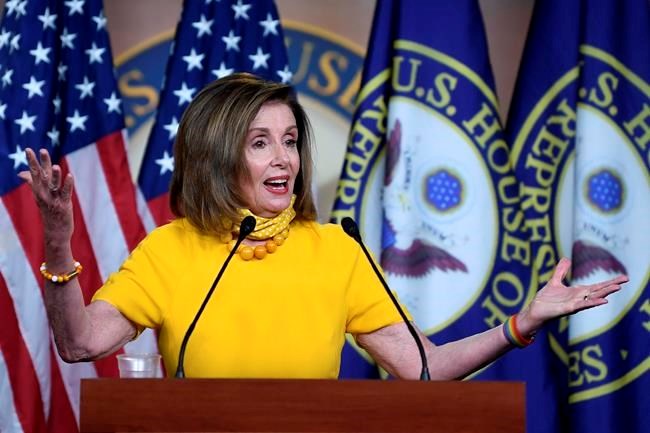WASHINGTON — Public anger over the police killing of George Floyd is unearthing difficult questions in the United States, Canada and around the world about statues, monuments and other permanent tributes to historical figures whose legacies include oppression, racism and cruelty.
For House Speaker Nancy Pelosi, there's only one answer: the time to do away with them is now, she said Thursday — putting her on another collision course with President Donald Trump.
"Public sentiment is everything," Pelosi told her weekly briefing on Capitol Hill, where the stately Statuary Hall showcases 100 statues of U.S. historical figures commissioned and contributed by state governments, many of them Confederate leaders.
Pelosi wrote a letter this week urging the bipartisan committee responsible for the statues to do away with 11 of them, singling out in particular Jefferson Davis and Alexander Stephens — the president and vice-president of the Confederate States of America, both of whom were slave-owners who were charged with treason after the Civil War.
"This is a perfect time for us to move those statues," Pelosi said. "Other times, people may think, 'Oh, who cares, I never go there anyway, they all look alike to me, they're all these white men .... the timing might be just right."
Pelosi also supports rechristening several U.S. military bases named after Confederate generals, a measure that appears to have the support of some Republican senators even though Trump has promised to veto it.
Protesters, lashing out across America following Floyd's death on May 25, have made their feelings crystal clear.
On Wednesday night in the Virginia capital of Richmond, where Confederate monuments have been bathed in graffiti since the protests erupted last month, protesters toppled a statue of Davis, whose name and image remain a familiar sight throughout the state. They also hauled down Christopher Columbus and tossed him in a lake.
Similar tributes to Columbus in Boston, Miami and St. Paul, Minn., have been defaced, upended or beheaded, a reflection of the famous explorer's status as a symbol of a colonialism that perpetrated genocide, abuse and marginalization of Indigenous Peoples across North America.
The current groundswell of broad support for the Black Lives Matter movement isn't just in response to Floyd's death, but also other recent jarring inflection points in America's shared racial history, said Jeremy Mayer, a public policy professor at Virginia's George Mason University.
Those include the shooting deaths of nine Black members of a Bible study group at a church in Charleston, S.C., in 2015 and the infamous gathering of torch-wielding white supremacists in Charlottesville, Va., two years later.
Even NASCAR, the stock-car racing association that long gave safe harbour to wavers of the Confederate battle flag, has announced a ban on a controversial symbol it says "runs contrary to our commitment to providing a welcoming and inclusive environment for all fans, our competitors and our industry."
"Once we lose the emotional reverence for symbols, powerful institutions can turn on a dime and go, 'You know what, no more. That's it,'" Mayer said. "I mean, NASCAR gave up the Confederate flag."
In Canada, the historical treatment of Indigenous communities has fuelled a fearsome backlash against some of the country's most storied historical figures, including Sir John A. Macdonald, the country's first prime minister — and an architect of an oppressive and cruel residential-school system designed to commit what the Truth and Reconciliation Commission called "cultural genocide."
Statues of Macdonald in Kingston, Ont., and Montreal are frequent targets for vandals. In B.C., the city of Victoria removed one in 2018. And Halifax has done away with a bronze tribute to founder Edward Cornwallis, a notorious enemy of the region's Mi'kmaq, that became a flashpoint for racial tensions between Indigenous activists and white supremacists in 2017.
That same year, Langevin Block in Ottawa — the longtime home of the Prime Minister's Office, named for Hector-Louis Langevin, another notorious residential-school champion — was unceremoniously stripped of that moniker. Calls are also growing for Toronto to rename Dundas Street, named for Henry Dundas, a British politician who delayed abolishing the Atlantic slave trade.
Indigenous Services Minister Marc Miller, whose downtown Montreal riding is home to a Macdonald statue, said as the son of a history professor at McGill University, he's often thought about the thorny issue of memorializing figures with controversial pasts. James McGill himself, the university's namesake, was a slave-owner, Miller noted.
"I believe in educating. I believe in examining our history, criticizing it, re-examining it," he said, recalling the time his father expressed a desire to go back and teach a more modern version of Canadian history. To eradicate such symbols of history entirely would risk losing the opportunity to learn from it, he suggested.
"We always have to re-examine our history, educate ourselves. If we're blind to the past, we're blind to the future."
But public tributes that offend large portions of the population aren't essential to remembering the past, at least when it comes to Confederate leaders in the U.S., Mayer said.
"What we're talking about is not what do we remember, but what do we revere — and reverence and remembrance are very, very different things," he said.
"There are no statues of Nazis in Germany by law. So it's not that the Nazi history is forgotten; in fact, it's taught very well in Germany. But reverence is denied. And that is what is happening with the Confederacy."
This report by The Canadian Press was first published June 11, 2020.
— Follow James McCarten on Twitter @CdnPressStyle
James McCarten, The Canadian Press




